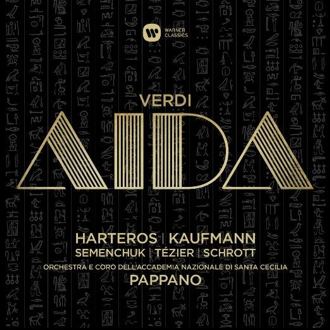|
|
|
|
|
|
|
|
|
The Guardian, 7 October 2015 |
| Andrew Clements |
|
Pappano brings gorgeous colours and textures to a spectacular studio recording
|
|
 The
first new recording of Aida from a major label since the beginning of the
century is also that real rarity nowadays – an opera set that comes from
bespoke studio sessions rather than being pieced together from concert or
stage performances. Warner Classics assembled a headline-grabbing lineup of
soloists for its much-hyped project in Rome last February, but the real
theatrical excitement on the discs is generated by the orchestra, chorus and
conductor. The playing that Antonio Pappano obtains from the Santa Cecilia
Orchestra wonderfully mixes refinement and power – it’s coloured with
perfect finesse in the dances towards the end of the first act and in the
nocturnal scene-painting that opens the third, while the great triumphal
choruses have tremendous presence and energy. The
first new recording of Aida from a major label since the beginning of the
century is also that real rarity nowadays – an opera set that comes from
bespoke studio sessions rather than being pieced together from concert or
stage performances. Warner Classics assembled a headline-grabbing lineup of
soloists for its much-hyped project in Rome last February, but the real
theatrical excitement on the discs is generated by the orchestra, chorus and
conductor. The playing that Antonio Pappano obtains from the Santa Cecilia
Orchestra wonderfully mixes refinement and power – it’s coloured with
perfect finesse in the dances towards the end of the first act and in the
nocturnal scene-painting that opens the third, while the great triumphal
choruses have tremendous presence and energy.
These spectacular set
pieces, spaciously recorded, anchor the dramatic trajectory that Pappano
gives so convincingly to the whole opera. Nothing seems to be pushed too
hard or laboured too much, and he makes sure the soloists get all the
support they need. What he cannot do, though, is give his principal singers
the depth of character they really need. Of the three at the core of the
drama – Anja Harteros as Aida, Jonas Kaufmann as Radames and Ekaterina
Semenchuk as Amneris – only Semenchuk had sung her role on stage before the
recording was made, and it’s perhaps no coincidence that dramatically she is
the pick of the three – more involving and more involved than the others,
and tremendously vindictive at the climax of the fourth-act trial.
Neither Harteros nor Kaufmann is a weak link, exactly – they are far too
good singers for that – but they do not seem to be engaged on the
three-dimensional level that a performance prepared with such obvious care
by Pappano really deserves. Harteros sings O Patria Mia, her big third-act
number, very beautifully; generally she’s good at the introspection, but she
sounds much less assured and focussed in more assertive moments. Kaufmann is
in magnificent voice – there’s no one around today who would have sung it
better – but there’s little about his performance that seems specific, that
is unique to this opera rather than being applicable to any Verdi or even
Puccini role that he might sing.
Admirers of the great Aida sets of
the past – Karajan’s with Renata Tebaldi and Carlo Bergonzi, Georg Solti’s
with Leontyne Price and Jon Vickers – should not feel that their favourites
have been usurped by the newcomer. But it’s now more than half a century
since both those versions were made, and if only for the gorgeous colours
and textures that Pappano and the state-of-the-art sound reveal in Verdi’s
score, this set is well worth hearing.
|
|
|
|
|
|
|
|
|
|
|
|
|